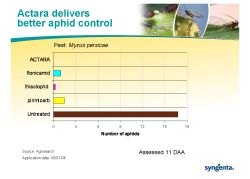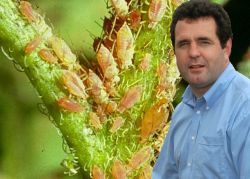
An entirely new insecticide, capable of controlling all aphid species in potatoes, including current resistant strains, was launched by Syngenta at British Potato 2007 in Harrogate this week (28-29 November). Actara is the first foliar application of the highly active new-generation neonicotinoid, thiamethoxam, which is claimed to give fast aphid knockdown - at a speed that is comparable to pyrethroid insecticides.
The chemical structure of Actara is uniquely different to other neonicotinoids, conferring high activity from low dose rates, fast uptake into the plant, true systemicity with rapid translocation and strong residual activity to give persistent pest control. A single Actara application has been shown to give two to three weeks control of aphid populations.
"Aphid control is essential to stop the transmission of damaging viruses in seed crops, as well as ware varieties susceptible to PVY and other viruses," advises Syngenta Speciality Crops Manager, Bruce McKenzie. "Actara gives an invaluable new option to control all aphid species, including aphids resistant to other insecticides."
Mr McKenzie points out that, unlike other resistance-busting insecticides, the speed of kill with Actara is so fast that growers do not necessarily need to add a pyrethroid. However, he highlights that when Actara is applied in conjunction with Hallmark Zeon, growers get the added benefit of repellent activity to discourage further aphids flying in.

He advocates that for seed crop growers, making multiple insecticide applications through the season, Actara will play an essential role as an early treatment. "Actara will clean out colonies of resistant Myzus persicae in the crop, so any subsequent applications of Aphox or Hallmark required to protect against further damage from aphid feeding activity will have the greatest opportunity for success," he adds. Growers are permitted to make two Actara applications during the season on seed crops and one on ware.
Mr McKenzie also believes the persistence of Actara means just one application could see virus susceptible ware varieties protected through key growth periods, when the risk of disease transmission is highest.
Syngenta Technical Manager, Jon Ogborn, reports Agrisearch trials in Derbyshire last year highlighted the strength of Actara for control of Myzus persicae (Peach Potato Aphid) - the key vector of damaging potato viruses. Assessed eleven days after treatment there were no Myzus even in the mid-canopy layer following the Actara application, compared to both thiacloprid and flonicamid applications where aphids were already present and the risk of virus spread increasing.
Mr Ogborn also reports trials have demonstrated the persistence of Actara, with the excellent control of aphids continuing three weeks after application, when aphid populations treated with thiacloprid had increased by over 250% between weeks two and three after application.
He adds that Actara has been shown to have the highest rate of uptake of any neonicotinoid. "In warm, dry conditions, when aphid numbers can be increasing very rapidly throughout the crop canopy, the high water solubility of Actara will prove extremely valuable in targeting aphids quickly and effectively.
"The rapid uptake of Actara is also important to give rainfastness in wet conditions or when irrigation is scheduled," according to Mr Ogborn. "Once in the plant, Actara quickly moves through leaves and stems to target aphid colonies in the crop canopy that might escape contact or translaminar insecticide applications."
Bruce McKenzie added: "Our research with growers and agronomists clearly highlights that speed of aphid kill, persistent activity and the ability to control resistant strains of Myzus persicae are the primary concerns of growers; Actara scores very highly in all these areas."
Actara has the lowest dose rate of the neonicotinoid insecticides, with an application rate of 80g/ha. "This high activity from a low dose rate is entirely concurrent with objectives throughout the potato industry," reports Mr McKenzie. "Furthermore, for the grower, it reduces the packaging for disposal and the time taken to fill the sprayer in the field - ensuring they can achieve higher levels of aphid control faster and more efficiently".
